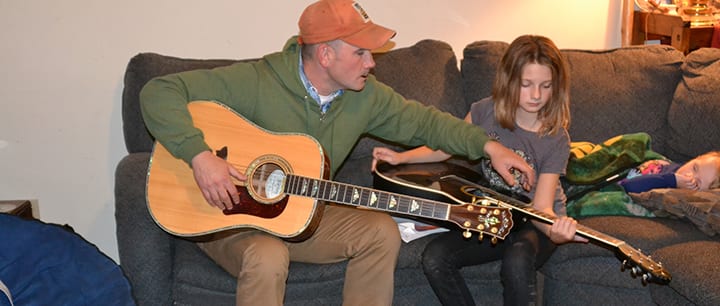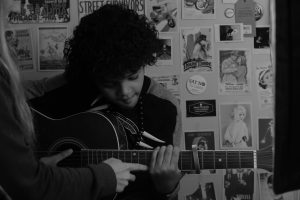 Not sure how long your guitar lessons should be? Take some advice from guitar teacher David G. and you’ll be on the road to success…
Not sure how long your guitar lessons should be? Take some advice from guitar teacher David G. and you’ll be on the road to success…
When prospective students are looking for a potential music teacher they are searching for a number of different aspects to their lessons. Most private teachers have a range of options for lesson times that they offer their students, the most common being 30 minutes, 45 minutes, or 60 minutes in length. There are a number of things to consider when choosing how long your guitar lessons should be.
“I want to learn how to play guitar!”
If that’s a sentiment you’ve found yourself thinking or even saying out loud in recent days, it’s time to start learning how to play guitar. The first question that many students ask themselves (besides how hard is it to learn to play guitar) is how much time they should dedicate to their lessons.
This is a question of practicality as well as money.
When prospective students are looking for a potential music teacher they are searching for a number of different aspects to their lessons. Most private teachers have a range of options for lesson times that they offer their students, the most common being 30 minutes, 45 minutes, or 60 minutes in length. There are a number of things to consider when choosing how long your guitar lessons should be.
In this post, we’ll tell you everything you need to know about the time you should dedicate to learning how to play guitar.
How Should a Beginner Start Playing Guitar?
If you want to know how to learn to play a song on guitar, consider taking these steps as you begin learning how to play guitar:
- Start with the right guitar for your needs
- Make sure you have the other equipment you need, like a tuner, capo, and extra strings
- Practice how to hold a guitar pick
- Learn guitar string orders and names
- Learn how to use a guitar tuner
- Practice strumming in perfect rhythm
- Memorize your notes
- Learn basic chords and other exercises
- Practice as often as possible!
- Take guitar lessons with a qualified instructor
Watching videos can help you master your technique and commit core concepts and movements to muscle memory.
Case in point? Here’s a video that can acquaint you with the proper guitar hand placement you need to be successful:
How Long Does it Take to Learn to Play Guitar? Lesson Lengths Explained
When you’re learning how to play guitar, one of the biggest questions you’ll likely ask yourself is, “how long?” To learn to play guitar, you’re going to need to dedicate some serious time to the task.
If you can practice guitar for around 30 minutes a day, three to five times a week, it will only take you a couple of months to be able to play beginner guitar songs, and another six months or so to play more advanced songs with highly technical elements.
Here are a few lesson lengths you’ll be able to choose from as you’re working with an instructor and learning to play guitar. Even if you are interested in how to learn to play guitar by yourself, working with the intervals of time listed below can be helpful in gauging how much time to set aside for your self-instructed lessons.
1. The 30 Minute Lesson
I recommend that most beginning guitar students start with a 30 minute lesson for a number of reasons. If you are brand new to learning how to play guitar it is important during your first few lessons to gauge your interest level in the instrument. Many people have an idea that they want to learn to play guitar but it is not only a financial commitment but a time commitment as well, so it is important to think realistically about how much time and money you are willing to put in to work on the instrument.
For younger students specifically, a 30 minute lesson is a perfect slot of time because most students cannot focus effectively for a longer period of time than 30 minutes. In your first few lessons your teacher will be giving you a lot of information about a variety of aspects of learning to play and practice guitar effectively. At times this can feel overwhelming for new students but it is important to remember that when learning anything your mind needs time to absorb all the material that is being presented; it will get easier.
2. The 45 Minute Lesson
Most students that choose to have a 45 minute lesson are at an intermediate level of experience playing the guitar and are more serious about learning how to play guitar at a faster rate of time. Generally speaking your teacher will price the lessons so that you get more for your money by choosing a 45 minute lesson vs choosing a 30 minute lesson.
I personally recommend my students select a 45 minute lesson if they are in the age range of 12 to 18, where they are able to focus for longer periods of time, and you mutually feel that the student is progressing at a rate that is suitable for that particular individual.
3. The 60 Minute Lesson
Students that select a 60 minute lesson fall into a number of different categories of people who are learning how to play guitar.
Most commonly I recommend that students take a 60 minute lesson if they are an advanced guitarist or if they are a prospective college student looking to audition at a school specifically for studying music. Similarly to the 45 minute lessons, teachers generally price a 60 minute lesson so that it is the best overall deal for the student where you are paying a price that maximizes your time with your guitar teacher.
A 60 minute lesson is mandatory for students looking to enter college as a music major. The reason for this is that at your music school you will be taking a 60 minute lesson with your professor at most major schools for music.
As an advanced student your teacher will expect and demand more out of your playing.
When you are auditioning on guitar at a school for music you are expected to be proficient in scales, arpeggios, sight reading, and performing repertoire at an advanced level. I like to segment my 60 minute lessons into categories to address each of these topics and allow students sufficient time to master their material and concepts.
10 More Tips for Learning How to Play Guitar
Still not sure you have what it takes as you dive headfirst into your guitar lessons? Don’t worry. Learning how to play guitar can be an understandable daunting task. However, with some dedication and time, you’ll be strumming along with the best of them.
Here are some more tips to follow as you are learning how to play.
- Keep your guitar in good condition. Replace the strings often to make sure your notes are as sharp and clear as can be.
- Consider using a guitar app. Guitar apps can give you access to the tools and instructors you need right at your fingertips. If the resources are more accessible to you, you’re going to be much more likely to use them.
- Play with a metronome.
- Carve out regular time to practice
- Consider recording yourself so you can view your technique and see areas that need to be improved.
- Try new things. Don’t always stick to the same chords or scales but instead, practice different variations so you can build your repertoire.
- Always warm up!
- Practice with a group of other players to keep things fun and exciting.
- Learn how to pick up songs by ear.
- Be patient with yourself! Rome wasn’t built in a day and it’s going to take time to become skilled.
Can You Learn to Play Guitar By Yourself?
You’re wondering if it’s possible – or perhaps even how – to learn to play guitar by yourself. The answer is that yes, it can be done. There are plenty of “how to learn to play guitar” YouTube videos and other kinds of tutorials you can tap into if you want to start learning to play guitar but don’t necessarily want to pay for lessons.
However, when it comes to how to learn to play guitar fast, you’re not going to get the same benefits flying solo as you would if you worked with an instructor. Unless you’re a natural guitar-playing savant, you’re going to need some extra help to get you where you need to be.
Therefore, lessons with a private guitar teacher are almost always the way to go.
When selecting your lesson length with your private guitar teacher consider the following features. The cost, level of commitment, your experience with the instrument, your ambitions with the instrument, and what feels right. Learning guitar is an incredibly rewarding and exciting instrument as you progress with your experience. Best of luck and remember to always work hard and have fun!
 David G. teaches guitar, music performance, music theory and piano in Buffalo, NY. He received his Bachelor of Music from SUNY Fredonia, as well as his Master of Music Performance from University at Buffalo. David is a multi-talented musician as a performer, composer and has been teaching students since 2006. Learn more about David G. here!
David G. teaches guitar, music performance, music theory and piano in Buffalo, NY. He received his Bachelor of Music from SUNY Fredonia, as well as his Master of Music Performance from University at Buffalo. David is a multi-talented musician as a performer, composer and has been teaching students since 2006. Learn more about David G. here!
Photo by Tobyotter
Jill Cole





